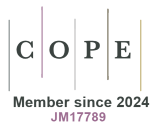Most read articles by the same author(s)
- Marco Chiumente, Alberto Russi, Federica Todino, Daniele Mengato, Marina Coppola, Melania Rivano, Angelo Claudio Palozzo, Claudio Jommi, Preparation of intravenous chemotherapy bags: evaluation of a dose banding approach in an Italian oncology hospital , Global and Regional Health Technology Assessment: Vol. 8 No. 1 (2021): January-December 2021









